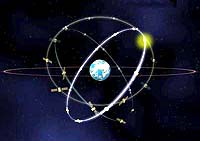The Ministry of Taxation will allocate 50 million NIS to the project and the other ministries and industries participating in the project an additional 50 million NIS

The Ministry of Defense and Israeli industries active in the field of space (TAA, Rafael Orbit, Rocar and Acubit) agreed this week on the model for the industries' participation in the funding required to enter the project.
Raanan Dinor, Director General of the Ministry of Natural Resources and Energy, stated that the ministries of Natural Resources, Treasury, Defense, and Science are cooperating both in the efforts to enter this project and in the distribution of the budgetary cost. The ministries will allocate a total of 100 million NIS over five years for participation in this project, the Ministry of Taxation will allocate 50 million NIS to finance the project and the other ministries will allocate the balance among themselves, the industries participating in the project will participate in funding to the extent of 15%.
Dinor also stated that the work of the headquarters that was done in preparation before entering the project raised multiple benefits related to participating in it. In the first phase, the main beneficiaries are the space industries who will participate in a space project with the leading European companies in the field, and will be able to gain a lot of knowledge in a field in which Israel has no experience in space. However, Dinor emphasized that in terms of the participation potential of the Israeli industry, most of the mass is concentrated in the field of applications that will be developed for the use of this system.
The Galileo project is the largest commercial space project in the world and its goal is to establish a civilian system to provide accurate location and time services. The European Union and the European Space Agency entered this project from a civilian commercial point of view, which distinguishes it from its American counterpart, the Pentagon's GPS, and the main thing is the ability to penetrate these markets and take over market shares, in which American hegemony currently exists.
The CEO of the TMT, Ra'anan Dinor said that in his meetings with the Europeans, they emphasized that they are looking for the added value and Israeli creativity in the field of applications, as these will determine the commercial success of the system. He added that his office will also support within the framework of the Office of the Chief Scientist in R&D for these applications and within the framework of participation
Israel In the project, consortiums of Israeli and European companies will be established for the purpose of those developments.
In the CEO's meetings with companies dealing in the fields of applications, it emerged that the "name of the game" is entering the project as early as possible, with the intention of gaining access to technological knowledge, normal activities, business information, etc., which are necessary for competitive penetration of the market shares. The companies said that in similar projects in the past, Israel entered late, and this led to a low competitive ability.
Boaz Hirsch, who is in charge of bilateral trade agreements at the Foreign Trade Administration, said that in addition to the industrial benefits inherent in cooperation with Europe, there are also the political benefits of Israel's entry into the European Union's flagship project and emphasized that in addition to being a partner in the project, China and India are also in advanced talks to enter the project, and there is It is very important to be able to work with these huge countries on an egalitarian basis in a major project of this kind.
Boaz Hirsch from the Foreign Trade Administration at TMT says that the commercial operation of the project is planned until the end of the decade, when the tender for the commercial concession to operate the system was opened, 4 European consortia competing including huge companies from Europe and the world. Today only 2 remain in the process. The European Union emphasizes the great interest aroused by the tender for the commercial operation of the system as a marker of the commercial - occupational - technological potential inherent in the project.
The interest of the companies, the representatives of the Union submit, supports the findings of the study conducted by the European Union, from which it appears that in 2020, the global financial turnover in the field of satellite navigation is expected to reach over 200 billion euros compared to a few billions today, which also represent a 25% increase in the last four years in this field . The field of applications itself is expected to reach a market size of 140 billion euros in 2015. Among the main growth engines in this field are the cellular and automobile fields, and it is expected that massive use of satellite navigation systems will be made in these fields.
Yidan Israel in space
The national coordinate system - in Astropedia
https://www.hayadan.org.il/BuildaGate4/general2/data_card.php?Cat=~~~72047479~~~190&SiteName=hayadan
